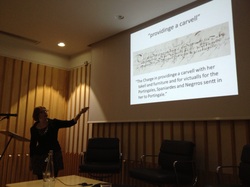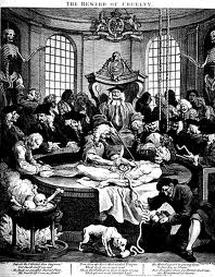 Me showing off my paleography skills!
Me showing off my paleography skills! It was quite a thrill to be speaking at the British Library, a place I have made regular pilgrimages to for many years now. I even spent some time there helping to catalogue some watercolours of animals in the first Indian zoo in Barrackpore back in 1999. But I digress...
Michael spoke first, and I was very jealous of his excellent presentation skills and all the lovely pictures he had to illustrate his talk, which was on the black magus he had found in a rood screen painting of The Adoration of the Magi (c.1520) in the V&A, which was probably made in Devon. In fact, he very effectively compared it with other rood screen images he had found in Devon, and traced the journey of the black magus image from Cologne to Bruges, Alsace and Devon. You can read a transcript here and download his presentation. One of the most interesting images for me was of Holy Roman Emperor Henry VI's entrance into Sicily in 1191, heralded by black trumpeters, as it reminded me of the long tradition of royal musicians to which John Blanke, Henry VIII's 'black trumpet' , who I am speaking about on Tuesday at Peckham Library, belonged.
My only real criticism was that Michael didn't really differentiate between Europe and England, with statements such as "Blacks were seen legally as slaves and culturally as barbarians." Whereas my research has show that Africans were not slaves in England at this time. He quotes "the chronicler of an English voyage to Guinea" in 1554 (Robert Gainsh) as describing "A people of beastly living, without god, lawe, religion or common wealth". However, that same voyage brought five Africans back to London, who admittedly were described as "slaves" in the text, but were not treated as such, but only kept here only long enough to learn some English, after which they were returned to Guinea to act as interpreters and trade factors. The only record we have of their experience is brief but evocative: "some were tall and strong men, and could wel agree with our meates and drinkes" although "the coulde and moyst ayer dooth sumwhat offende them". Looking out the window today, I can imagine why they might have found the London air objectionable! Though, at least according to the Cartwright judgement of 1569, "the air of England is too pure an air for slaves to breath in".
My own talk is a bit of a blur now (Michael seems to remember it better!). Basically I shared some documents I'd found in the Lansdowne Manuscripts, a collection held by the British Library. A letter written by the Mayor of Bristol, William Hopkins to the Privy Council in 1590 (two years after the Armada battle and at the height of the war with Spain), and an attached set of accounts written by his Chamberlain, regarding a prize ship that had been brought into Bristol by her Majesty's (Elizabeth I's) pinnace The Charles (captain Jonas Bradbury). There were 32 Spanish or Portuguese and 135 Africans on board the prize ship. Using the documents, I explained why they were on the ship, what happened to them during their stay in Bristol, and the significance of the fact that they were sent back to Spain within the week.
The conversation and Q&A afterwards was wide-ranging: from Hollywood swashbucklers to Moorish Spain via Caspar Van Senden. Perhaps the most philosophical question came from a gentleman from Ghana: why do we always view Africa as peripheral to Europe, perhaps Europe is in fact peripheral to Africa? This is a matter of perspective I suppose. One book I've read that tries to address this is David Northrup's Africa's Discovery of Europe (Oxford, 2002). I think I'll read it again!
The event was recorded, and we're hoping it will be available as a podcast in due course.
Our talks were actually the first in a Readers' Research series- which seems a great idea. Often I look around (and I think Dr. Bressey made this point too) and wonder what the studious-looking people around me are studying. On the ocassions when I have managed to strike up a conversation, it has always been interesting. So anything that encourages us to interact and gives us more reason to hang out in the BL's many cafés, seems like a good idea! The fact that Michael and I, not exactly wallflower types, actually both discovered the material we presented in summer 2008 but never met until last autumn shows how much more could be done to forge connections between readers.
If you're kicking yourself that you didn't make it, or were turned away (we sold out!), then please come along to one of my upcoming talks at Peckham Library on Tuesday or The National Archives on Friday 16th November.

 RSS Feed
RSS Feed
